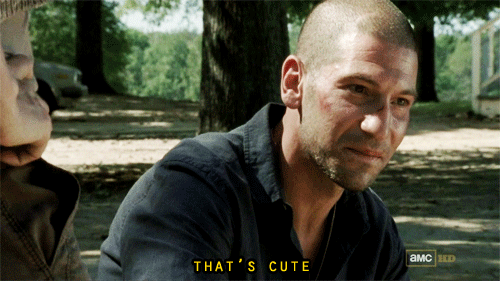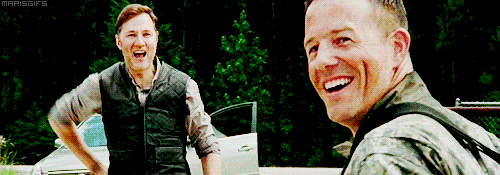Masculinity and Zombies
So, who saw the Walking Dead Sunday? CRAZY RIGHT?! If you didn't see it, I won't spoil it. But you better watch it soon, because it's all about my boy "The Governor". But, after watching Sunday's episode, I thought it may be interesting to examine masculinity and some of the central male characters in the show. So if you're a Walking Dead fan, this'll be fun! If not... Please stay here, my ego couldn't take you leaving!!! So here we go, and please feel free to leave responses, comments, and your own two-cents below!
Rick Grimes: Protagonist and leader of the good guys, Rick has almost always been a positive character. Though in the recent seasons the show has been exploring his darker side, I personally believe Rick is pretty darn good example of healthy masculinity in a world of un-dead people who are busy eating each other. From his first conversation that we witness in Season 1, Rick is working on fixing his strained relationship with wife Lorri. While his buddy Shane (more on him later) is busy cracking sexist jokes about Women, Rick replies saying something like "I would never say anything so cruel to her"; demonstrating that his relationship of one based of mutual respect and caring. Even when he can't find her, or his son Carl, he develops his single minded goal of just making sure there safe. Even when he becomes the groups impromptu leader, he does his very best to not let his morale code slip, while still protecting everyone he is responsible for. Rick exemplifies the ideals of a "real man", treating all those around him on equal footing, regardless of sex, race ("As he is, we're just white and dark meat out here now!"), or whatever else. As a cop and a man who is no stranger to violence, Rick could always strong-arm his situations, but he almost always chooses the non-violent route as long as it's an option. He also steps into the role of leader when needed, making the tough decisions when no one else can, while still listening to those he protects and never letting go of his morale code.(Though he did have that "Ricktatorship" phase, but hey, mistakes happen!)

Shane Walsh: If Rick is the example of healthy masculinity, Shane is the total opposite. Shane's first lines in the show are all basically about how "Women can't remember to shut lights off no matter how much you yell at 'em" (once again, paraphrasing)... Yeah, not a good start. He then proceeds to up his "real man" track record by sleeping with his best friend's wife, and just being a generally unlikable leader. Shane basically forgoes his morale code, and takes a pragmatic "kill or be killed" style of leadership. This may SOUND like it be palatable when the zombies start coming, but Shane eventually ditches all concepts of guilt, shame, and morality because he thinks that's the only way to survive. This leads him to become unstable, dangerous, and even to turn on his best friends. Shane, while originally just kind of a jerk (but albeit, not a terrible guy), just becomes the type of man no one should aspire to be.

The Governor: Philip, Brian, "G-Money" whatever he wants to be called, is a bit complex. On the surface, some of his qualities are quite admirable as a leader and example of healthy masculinity. He did lead a group of people quite well; keeping them all safe, and even comfortable, something that isn't too easy when running water is a pipe-dream (HA!) and corpses are eating people's faces. His form of leadership reflects a hybrid or Shane and Rick, which may be morally questionable, but serves his people well. Yes, he makes some cold decisions, but he does it for the better of his people. HOWEVER, the reason I said "on the surface" is because once we find out a bit more about the Gov, it turns out he's kind of a sadistic psychopath... I'm talking zombie heads in jars, just chillin' in his office. We start to learn that he may not be making these tough decisions because he loves his people, but because he enjoys being in power. As season 3 progresses, he becomes unstable, and eventually dangerous. As in, he becomes the main villain of this entire series. All his reasoning and judgement disappears, and he ends up murdering a bunch of innocent people! Wow. Yeah, that's pretty damn bad. When we see him again in season 4, he kicks back into morale mode and starts protecting a little girl that reminds him of his lost daughter. He even risks his life for her, which is pretty admirable. You know what kinda of ruins him though? that whole shooting innocent people thing.

Yeah, no healthy masculinity here.
SO, that's my list and some analysis to boot! I wanted to include Daryl, Hershel, and Glenn, but sadly I feel like this running long. Maybe I'll do a sequel sometime... Please comment, leave opinions, or just say really nice things about me. All are good.

BUT EITHER WAY, THANKS FOR READING!!!


That was fun, I love hearing how others see the characters. Looking forward to the sequel!!
ReplyDelete